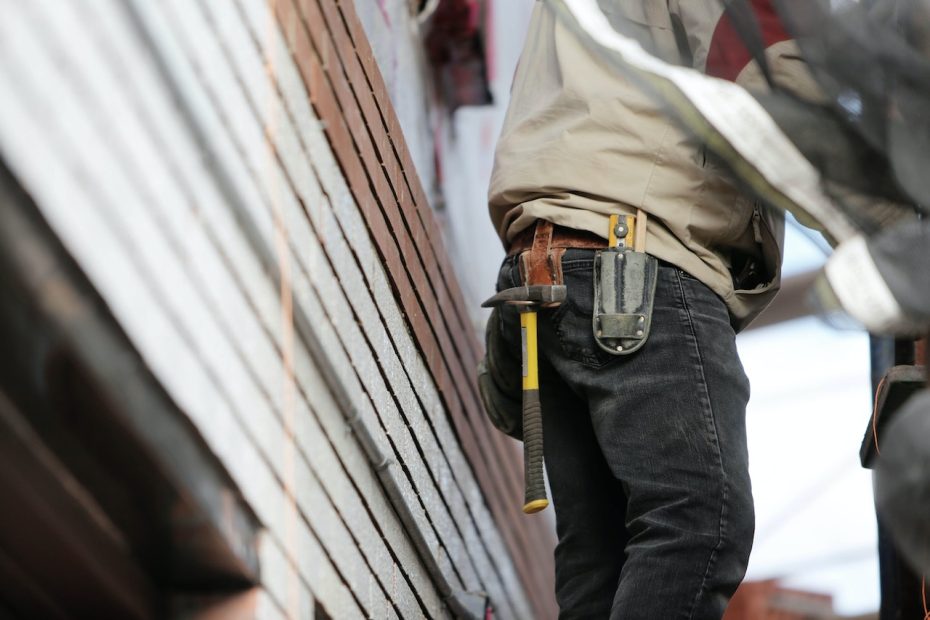Minor repairs and home improvements are a hassle when you own rental property, and your busy schedule doesn’t help. Staying on top of the daily activities and searching for skilled workers to handle larger jobs is a nuisance. Hiring a general contractor costs too much money, and searching for contractors for specific jobs is hit-or-miss. It would be a great help if you had a dependable person to handle your “honey-do list.” How do you know when you are big enough to hire a full-time handyman?
You need about 50 units to hire a full-time handyman, but a better indicator is when your total costs for contracted labor equals the cost to hire an employee.
Many of my other articles stress that you shouldn’t personally perform maintenance on your rental houses. If you are doing this, you should transition to using contractors before you hire an expert handyman. This will give you an idea of what to expect from your eventual employee. Assuming you already use contractors, this article will provide everything you need to know about hiring a trustworthy handyman to service your rental portfolio.
How Many Units do I Need Before I Hire a Full-Time Handyman?
Once you have about 50 houses, you can consider having a full-time handyman. You can almost fill up the handyman’s day with this number of houses while still leaving them time to handle spontaneous bigger jobs. It’s challenging to know the exact cost of contracted labor because often, the jobs are bid with materials and labor included. This can be a rough estimate, and it’s not a disaster if you seek out handyman services too soon.
Determining what you pay for contracted labor is not always straightforward. A simple profit and loss statement will not have this value. Many of your total operating expenses are not related to maintenance work. Much of the money spent on maintenance is for work that requires a license, and you wouldn’t expect a handyman to do it, such as HVAC and Electrical work. On top of this, the invoices you receive will often not have labor and materials broken down. It will take some work to determine what you are paying for the labor your handyman will perform.
On a personal note, I could hire a handyman for my properties when I was spending about $3,000 per month on labor that my handyman could do. At that time, I had 48 properties, and now I have 68 properties and a couple more in the works. It’s been almost four years since I hired my first handyman, and currently, I am working with my third handyman.
How Should I Pay a Handyman to Work Exclusively for My Rental Houses?
The best way to pay a full-time handyman is a weekly salary.
When you pay the handyman an hourly rate, there will be slow weeks that result in low pay. This causes undo hardship, and often the handyman will find other work. The extra jobs will end up interfering with your work, and the result is nearly the same as hiring a contractor for each job.
You should pay your handyman each week. If you pay them monthly, the employee will frequently run out of money near the end of the month. As a result, you will often be asked for advances, and the handyman will take on other work. As mentioned above, your job will suffer when the handyman takes on additional work.
How Much Should I Pay My HandyMan?
The amount you pay the handyman is regional. You should already have a good idea of labor rates from contractors you have paid in the past. You can also get labor rates at Lowes and Home Depot for the work your handyman would do, such as installing a water heater or a faucet. Because I am providing a steady income, I aim to be at about 75% of the hourly contractor rate.
Anecdotal evidence of what I have paid.
The first time I hired a handyman, I paid him $650 per week, which caused many problems. He complained if tenants called on the weekend, he was slow to respond, and tenants complained of unprofessional behavior. I was eventually forced to him. Don’t be cheap here, as I was; it leads to problems in the long run.
I paid my second handyman $700 per week to start and $750 per week after three months. The quality of work was excellent, but he constantly complained about his job. He worked for me for about 18 months and then moved out of state.
My current handyman started at $800 per week and now makes $850 weekly. I am delighted with all aspects of his work. I’ve never heard him complain, and his work quality is exceptionally high. I give him a year-end bonus of $1,000, and I am considering switching the bonus to a profit percentage to incentivize him to keep costs down.
What Should my Handyman do?
When hiring a full-time handyman, it helps to know what duties they will perform. The handyman should be able to do general maintenance, small jobs, and even a larger home improvement project. However, it’s a good idea to bring in a local contractor to help them with larger projects or when you buy a new home. After all, the handyman must be responsive, and tenants will call with small repairs throughout the day. The handyman should be expected to help with an odd job, make runs to the hardware store, and bring their own tools.
The required handyman skills should include everything on the list below.
- Basic plumbing, for a big job, use a licensed plumber
- Basic electrical, for a big job, use a licensed electrician
- Changing light bulbs
- Replacing a garbage disposal
- Painting
- Gutter Cleaning
- Replacing Light Fixtures
How Do I Find a Good Handyman?
The best way to find a good handyman is the same way you find contractors. These include word-of-mouth, Facebook, NextDoor, Craigslist, and local postings at home improvement companies. Search for individuals with the needed skills, not companies performing contractor services.
Your goal is to find a few contractors with the methods above and then hire them for real jobs. With this approach, you can evaluate the quality of work, punctuality, and professionalism while working with your tenants. Having them do work similar to what you expect them to do as your full-time handyman is essential. Ensure that they work on actual tenant calls and then ask for feedback from the tenant. You don’t want to train the handyman; you want them to be ready to work professionally.
After trying out a few contractors with an eye on offering them a job, select the one you feel fits the job best. Make them an offer, and be clear about the responsibilities. Now is the time to lay out the job responsibilities and tell them everything you expect from them. Hopefully, they will accept the offer, but if not, move to the next one on the list.
Lessons Learned with a Full-Time Handyman
Below are some lessons that I have learned after making many mistakes.
- When evaluating a handyman, hire them as a contractor and have them make home repairs on some vacant properties. I’ve had workers who are great when a tenant is there but waste time and leave the job when no one is watching.
- Don’t worry about times when there isn’t enough work. Tell the handyman upfront that it’s okay to take off with pay if there is no work. In return, you expect them to work night and weekend emergencies without extra pay or complaints. Everyone I have hired or interviewed has been okay with this.
- Spot-check with the tenants after maintenance calls. Make sure the tenant is happy and that the handyman acts professionally. I had a problem with a handyman making advances toward a tenant and later found they had done this before.
- Don’t micromanage the handyman. Let your handyman make their schedule and prioritize the work as long as they can do it effectively.
- When the workload spikes due to additional vacancies or new properties being added, hire contractors to avoid overworking the handyman. However, ensure the handyman takes the work with the higher labor cost.
- Ensure the handyman receives sufficient weekly pay, and discourage them from taking side jobs. Their side jobs will often interfere with your work, and occasionally the handyman will find another job working the side jobs.
- The most challenging attribute to find in a full time handyman is the ability to keep the tenant happy. Many are great craftsmen, especially when renovating a vacant house, but they are terse and unreliable with tenant matters. Make clear that the primary goal is to keep the tenant happy.
In Summary
As your rental portfolio grows, it is increasingly harder to find reliable contractors to respond to tenant issues and get your houses ready for the next tenant. Hiring a full time handyman is an excellent solution to this problem. Delegating this work to permanent employees will give you more free time and allow you to handle more critical tasks.
I’ve explained why you should consider a professional handyman once you have about 50 rental properties. The best way to pay the handyman is a flat rate, which should be about 75% of the hourly contractor rate. To find the best handyman, I recommend word-of-mouth, social media, and local job postings to find individuals with the necessary skills. Then I would hire them for actual tenant calls to evaluate their work, punctuality, and professionalism.
Following the tips outlined here will help you, but remember to adjust for regional differences and local ordinances.




